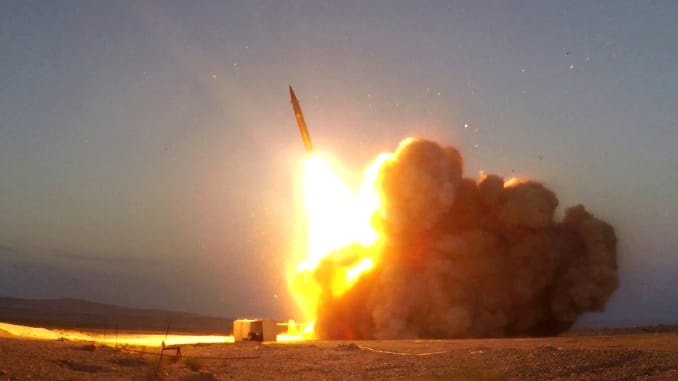Amanda Macias
A missile unveiled by Iran is launched in an unknown location in Iran in this picture received by Reuters on August 20, 2020.
WANA News Agency | via Reuters
WASHINGTON — Iran unveiled a new surface-to-surface ballistic missile on Thursday, a move likely to peeve Washington as the Trump administration attempts to rein in the regime’s missile and nuclear weapon ambitions.
Iranian Defense Minister Amir Hatami said in a televised address that the missile has a range of approximately 870 miles and is named after Iranian Gen. Qasem Soleimani, who was killed in an U.S. strike in Iraq in January. Hatami also said the regime had a new cruise missile boasting a range more than 620 miles and was named after Iraqi militia commander Abu Mahdi al-Muhandis, who also was killed in the strike.
Hatami added that the new missiles “will further strengthen Iran’s deterrence power.”
Iranian President Hassan Rouhani described the new missiles as important for defense.
“Missiles and particularly cruise missiles are very important for us. … The fact that we have increased the range from 300 to 1,000 [kilometers] in less than two years is a great achievement,” Rouhani said. “Our military might and missile programs are defensive,” he added.
A new cruise missile unveiled by Iran and called martyr Abu Mahdi is seen in an unknown location in Iran in this picture received by Reuters on August 20, 2020.
WANA News Agency | Reuters
The show of force comes as the Trump administration pushed members of the Security Council to extend a U.N.-imposed arms embargo on Iran. The embargo is currently set to end in October under the 2015 nuclear deal brokered, in part, by the Obama administration.
Last week, the Security Council voted to not extend the international arms embargo on Iran, a decision that prompted Secretary of State Mike Pompeo to formally notify the group on Thursday of the U.S. intention to “snap back” or restore all U.N. sanctions on Iran.
Thirty days after Pompeo’s notification, a range of U.N. sanctions will be restored, including the requirement that Iran suspends all enrichment-related activities. The “snap back” will also extend the 13-year arms embargo on Iran.
“Secretary Pompeo’s notification to the Council follows its inexcusable failure last week to extend the arms embargo on the world’s leading state sponsor of terrorism and anti-Semitism,” State Department spokeswoman Morgan Ortagus said in a statement.
Tensions between Washington and Tehran have mounted following Trump’s withdrawal from the landmark Iran nuclear deal in 2018, calling it “the worst deal ever.”
The 2015 nuclear agreement lifted sanctions on Iran that crippled its economy and cut its oil exports roughly in half. In exchange for sanctions relief, Iran accepted limits on its nuclear program and allowed international inspectors into its facilities.
Trump has previously said that the U.S. wants to reach a broader deal with Iran that puts stricter limits on its nuclear and ballistic missile work and suppresses the regime’s role in regional proxy wars. Tehran has refused to negotiate while U.S. sanctions remain in place.

No comments:
Post a Comment